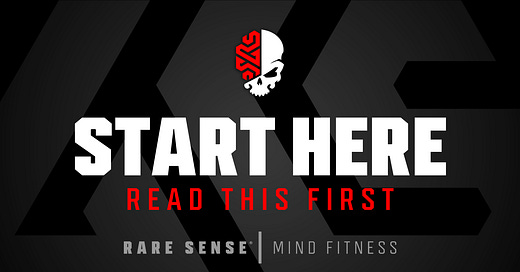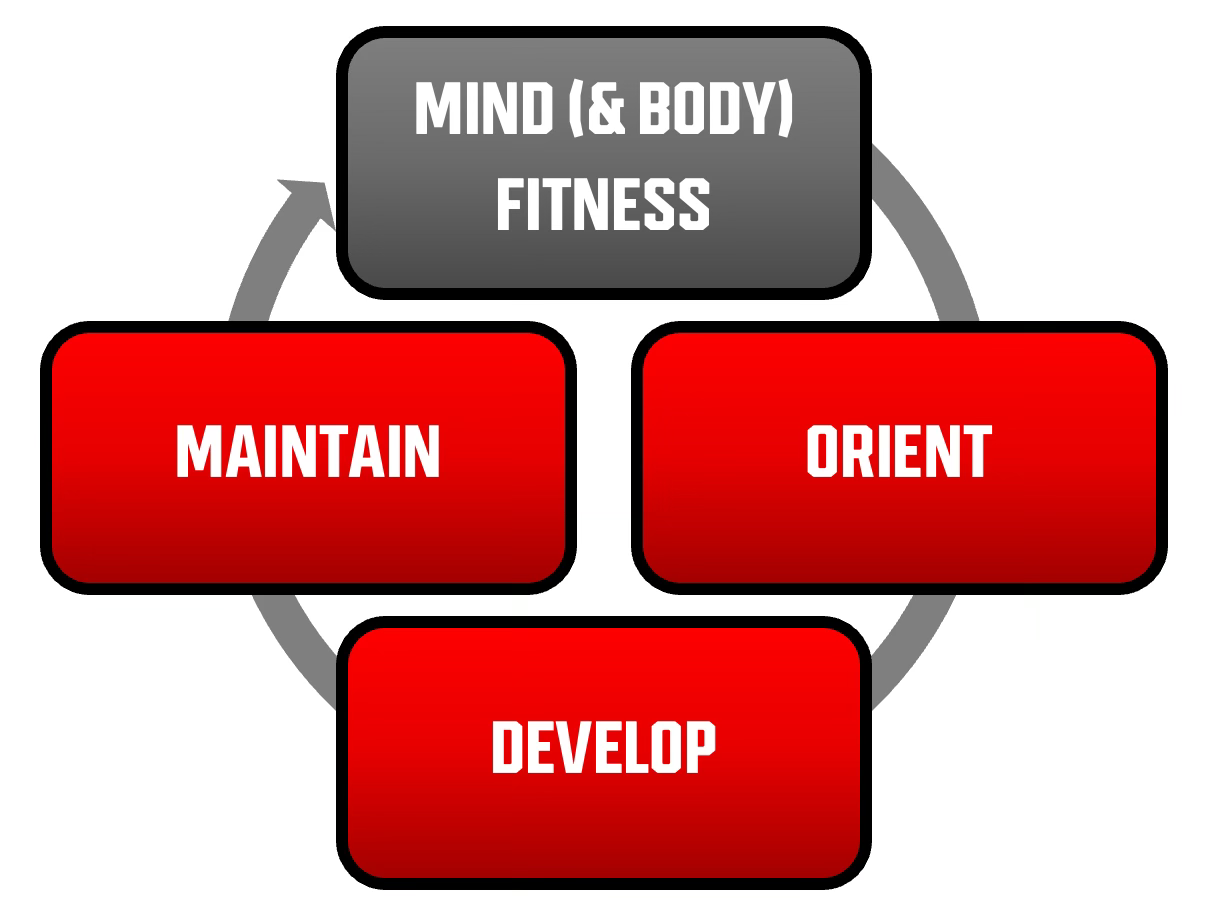This is the second article I’m publishing on Substack, but it’s the core RARE SENSE® document. Logan mainly discussed my background as a veteran and my reasons for doing this. Here, I’ll cover what RARE SENSE® is all about, why it’s essential, and how it can help you. Also, please read the About page for specifics on this site and how to navigate it.
RARE SENSE® is the theory and practice (what I call “the uncommon pursuit”) of mind fitness. It’s primarily based on lessons I learned while working for years to overcome mental health and chronic illness issues. Throughout this journey, I saw dozens of practitioners, ingested thousands of supplements, racked up hundreds of pages of lab results, read countless books, and tried all sorts of unorthodox treatments. It was an experience that taught me one critical lesson—the extent to which many of the solutions to my problems were within the power of my mind. RARE SENSE® represents the application of that key learning, based upon the best practices I’ve found, into a structured and cohesive approach.
Note that throughout any forthcoming content, I will not claim to be able to treat or cure anything. I’m not a doctor or a psychiatrist. Nor am I discrediting the expertise of people with those titles. I simply assert to be a sufferer who’s been down nearly every rabbit hole and tried almost any potential remedy over the last decade. That counts for something in the realm of credibility. You don’t need a fancy degree or license to inquire within and figure things out.
I’ve also found a lot of solace and inspiration in the voices of the afflicted. I hope what I’m doing here can motivate others to speak up so we might collectively express an attitude of courage, tenacity, and unity to overcome whatever ails us. After all, we’re the ones in the arena. As Maximus says in Gladiator,
We’ve got a better chance of survival if we work together. Do you understand? If we stay together, we survive.
My point is that RARE SENSE® isn’t a me thing. It’s a we thing. Let’s do this together.
The Current Paradigm
Everybody understands the importance of physical fitness. The healthier our bodies, the more capable we are, and the more enjoyable our lives can become. This classic approach is based on diet, exercise, and recovery. It’s a simple model. Eat well, work out, get enough sleep, and you’ll be healthy, barring any diseases.
But recently, the term human performance has become the rage. The idea is to optimize physical health through various dietary and workout regimens, biohacks, and technology like wearables and trackers.
Finally, alongside this evolution is an emerging trend of mindfulness and meditation as an adjunct. Taken in total, the current paradigm looks something like this:
Discussion
This works. But it mainly focuses on our bodies despite the obvious fact that what makes us the dominant species on Earth isn’t our physical makeup. Innumerable animals are more impressive in that category. They’re faster, stronger, and more powerful. Some can fly, and others can breathe underwater. There isn’t a single fundamental physical characteristic where humans rank at the top of the chart.
Homo Sapiens rule the planet because of our minds. No other living thing even comes close in terms of mental capacity. Therefore, we cannot reasonably take a slant on human performance that largely ignores this fact and almost exclusively concentrates on our physical well-being.
We also can’t think of mental development as purely limited to mindfulness. Meditation is a great practice, but it’s only one component of overall mind fitness.
Lastly, and maybe most importantly, everything we experience is a mental construct. If we are to take human performance seriously, we must view it with a mind-first attitude and find ways to be mentally fit as a priority.
A New Paradigm
The path to genuinely optimized human performance sees the factors of diet, exercise, and recovery as supportive of physical health via mental health. Looking through this lens (and considering that our brains control our bodies and absolutely everything we do), physical fitness comes from mind fitness. By taking the existing model and flipping it on its head (both literally and figuratively), we can shift the focus of our fitness regimens to our minds. By adding the components of mental orientation and development, we can round out the model and achieve a holistic approach to human performance (mind and body fitness).
The beauty of this construct is that it also reinforces itself. It’s cyclical. Better mind fitness improves the behavior that created it in the first place. This new paradigm consists of three blocks and looks like this:
I’ll detail what each of these pieces means in future content and lay out actionable measures to execute against them. For now, here’s a rough overview.
Orient
The absolute bedrock of mind fitness is orienting ourselves at any given moment. It’s becoming aware of thought and not needing to identify with it. We cultivate this ability through meditation, visualization, journaling, and establishing routines that help us focus on the present. If our minds start crafting destructive or depressing stories about the past, we replace them with gratitude. If we start succumbing to fear or anxiety, we reframe things with curiosity.
Develop
If we are oriented well, we can then develop ourselves. This involves a routine of reading, learning skills, problem-solving, creative expression, and free play. Our minds can’t grow without being challenged, and it’s here where most mindfulness practices fall short of a complete mind fitness picture. It’s not enough to only be aware of our thoughts. We want also to think better.
Maintain
The final thing we need to perform each day is maintenance. Your mind still relies on a healthy body and brain. Staying up all night eating junk food on your couch isn’t a recipe for success. Luckily, the same basic formula for a healthy body creates a fit mind. Many of us already have a physical fitness routine and must ensure it supports mind fitness. However, we also must treat the energetic component of our being through proper emotional processing and breathwork.
Training
You may have noticed that I used routine in all three paragraphs above. This was intentional. One of the key learnings I’ve found through proper mind orientation is that we are nothing more than a collection of patterns. Routine behavior, in essence, makes us. Establishing habits that coincide with the Orient, Develop, and Maintain blocks is critical to the success of the RARE SENSE® philosophy. This means we need proper training.
Conceptually, this is no different than what we do with our bodies. Everyone understands that people exist on a spectrum of physical health, from elite athletes to those who are morbidly obese. Improving (or maintaining) your position on that spectrum requires consistent effort.
Conversely, many of us approach mental health as if it’s a yes/no issue – like you either have problems or you don’t. Moreover, we believe the solutions are beyond our control and can only be addressed through treatment. This is simply untrue. Mental health also exists on a continuum, and one can become fit through one's own work.
Next Steps
It’s time we evolve how we think about our minds and their training. This isn’t just about people with mental disorders or illnesses. It isn’t just about meditation. It’s about understanding that our entire existence is mental. Everything starts and ends with thought.
Let’s redefine how we perform as humans. Let’s value the health of our minds and develop them through a regular exercise regimen. Let’s understand how we think and think better. Let’s seek a way to optimize our consciousness to benefit ourselves and the collective good through awareness, understanding, and wisdom.
Let’s start using some rare sense.
DISCLAIMER: RARE SENSE® content is not medical advice. Nor does it represent the official position or opinions of any other organization or person. If you require diagnosis or treatment for a mental or physical issue or illness, please seek it from a licensed professional.








Great stuff hear Chris. Excited to see where you take this. I really think you're on to something here.
Elite Mindfulness…I love it! I totally agree that “mental issues” are not a yes/no situation. We all have our moments, or even entire seasons where our perspectives are skewed by negative or positive routines. Just having an awareness of this can make one feel more empowered to change course on the current path of it’s not working. Can’t wait to read more